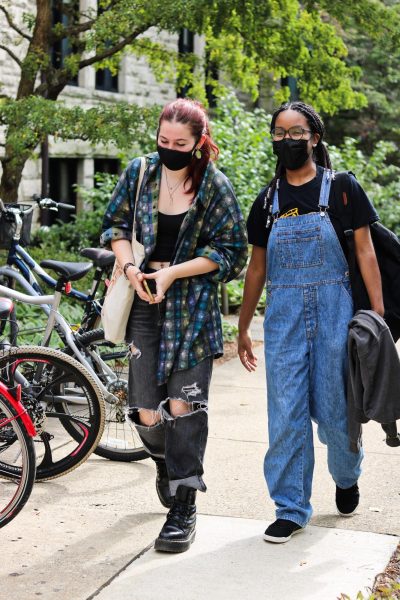Co-op Dining Enhanced My Oberlin Experience
I’ve noticed that the narrative around the Oberlin Student Cooperative Association is often dominated by its most veteran, involved, and enthusiastic members. I’m well on my way to becoming one of those people, but I think it’s important that I share my perspective as someone who was an outsider not long ago. After many people assured me that physical disability wouldn’t be a barrier to my contributing to the co-op, I decided to join the OSCA lottery this year. I figured I could always bow out and get a meal plan if the co-ops didn’t work for me.
I thought I was going to regret joining Harkness. I was worried that two meals a day wouldn’t be enough, I would miss the flexibility of campus dining, and I wouldn’t be able to adjust to a vegetarian diet after 20 years of eating meat for nearly every meal. While I concede that these concerns may have been relatively trivial and privileged, I had more significant ones as well. Harkness is famous for its culture — I once heard someone say that Harkness people are to Oberlin students as Oberlin students are to the rest of the world — and I thought I might not be able to fit in or keep up. Most importantly, though, I was worried a lot about not being able to equally contribute to my co-op due to physical disability. Instead of cooking and cleaning, I serve as one of Harkness’ Accessibility Coordinators, a job that allows me to contribute equitably to the co-op and help make OSCA a place where everyone can reap the benefits of the work they put in.
In spite of the nerves, I was excited. I had always heard great things about OSCA, and my friends in co-ops always seemed to value the communities they were a part of. Whenever I ate in a co-op last year, I was struck by how welcoming and friendly the environment was. It called attention to the corporate coldness of campus dining. Co-ops don’t require students to swipe in or limit themselves to one side dish — or two sides after 4:30 p.m. I love almost everything about being in a co-op: the people, the discussions, the food I thought I’d hate, the jellyfish parades (don’t ask), and the high-pressure sink that gets all the food residue off my dish in a few seconds. Now, I get to eat a good meal with people I care about twice a day.
A couple weeks into the semester, Harkness’ industrial dishwasher broke, which meant that we had to stop serving meals and were given meal swipes instead. Having to return to campus dining made me realize how much I’d grown used to the co-op and how inaccurate my apprehensions were. I noticed a drop in the quality of food I was eating, as well as the absence of the social atmosphere I’d come to associate with mealtimes. However, it’s important to acknowledge that for students who rely on OSCA for financial or dietary reasons, this Hark-less period was more of an issue for them than it was for me.
Being in a co-op helps me practice skills that I’ll use for the rest of my life, such as taking initiative and consideration of the people around me. OSCA emphasizes mutual responsibility. The co-op’s failure or success depends on everyone showing up and taking part; there will only be food if we cook it, and the kitchen will only be clean if we clean it. It’s like relearning the lessons in cooperation that most of us learned in childhood, but with higher stakes (and no steak). If a ball gets dropped, that means negative consequences for everyone. This is true for life in general, but living in a co-op really trains you to adjust your mindset.
The co-op model also makes me think about what a better world might look like. I’m so used to structures and organizations that don’t work for their members, so it’s refreshing to be a part of one that does. In OSCA, members receive direct return on their contributions, as opposed to corporations, where the people in charge often get most of the profit at the expense of laborers and consumers. OSCA gives co-opers the opportunity to decide what’s best for ourselves, rather than having that decided for us. Through consensus, a method of community listening and decision making, we all have the power to shape co-op policy and impact the well-being of our peers. In my experience so far, this system has been effective in ensuring that the co-op remains functional and that everyone’s needs are being met. It makes me wish that more people had chances like this to directly shape the organizations that provide for them.





